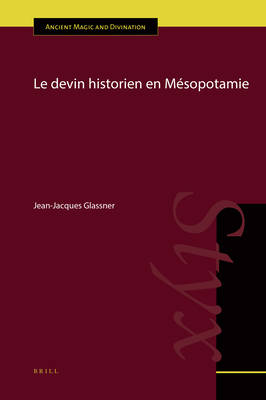
- Afhalen na 1 uur in een winkel met voorraad
- Gratis thuislevering in België vanaf € 30
- Ruim aanbod met 7 miljoen producten
- Afhalen na 1 uur in een winkel met voorraad
- Gratis thuislevering in België vanaf € 30
- Ruim aanbod met 7 miljoen producten
Zoeken
Omschrijving
Le devin historien en Mesopotamie is a combined study of divination and historiography. More than mere custodians of historical memory, diviners approached omens as written signs and developed a sophisticated semiology to recognize and order them. Diviners perceived omens as potentially rich in various meanings and cultivated an elaborate hermeneutic for working these out using hypothetical and inductive reasoning. Even if omens were removed from the recorded facts, diviners endowed them with a wide range of possibilities. Divination sought to establish links among historical, cosmic, and natural events because it investigated at once the past, present, and future. The first study of its kind since 1946, when only about 60 historical omens were known, this work presents 385 in a comprehensive edition.
"This will no doubt be a standard work for a long time to come."
-Lester L. Grabbe, Journal for the Study of the Old Testament 44.5 (2020)
"The strength of Le devin historien en Mésopotamie is its ability to immerse the reader in the mentalities of Mesopotamian scholars as they engaged over the centuries in the dominant scientific pursuit of their era."
-J.P. Nielsen, BIBLIOTHECA ORIENTALIS LXXVII 3-4 (2020)
"This will no doubt be a standard work for a long time to come."
-Lester L. Grabbe, Journal for the Study of the Old Testament 44.5 (2020)
"The strength of Le devin historien en Mésopotamie is its ability to immerse the reader in the mentalities of Mesopotamian scholars as they engaged over the centuries in the dominant scientific pursuit of their era."
-J.P. Nielsen, BIBLIOTHECA ORIENTALIS LXXVII 3-4 (2020)
Specificaties
Betrokkenen
- Auteur(s):
- Uitgeverij:
Inhoud
- Aantal bladzijden:
- 632
- Taal:
- Frans
- Reeks:
- Reeksnummer:
- nr. 16
Eigenschappen
- Productcode (EAN):
- 9789004390058
- Verschijningsdatum:
- 3/01/2019
- Uitvoering:
- Hardcover
- Formaat:
- Genaaid
- Afmetingen:
- 157 mm x 239 mm
- Gewicht:
- 975 g

Alleen bij Standaard Boekhandel
+ 747 punten op je klantenkaart van Standaard Boekhandel
Beoordelingen
We publiceren alleen reviews die voldoen aan de voorwaarden voor reviews. Bekijk onze voorwaarden voor reviews.











